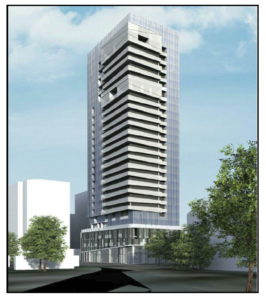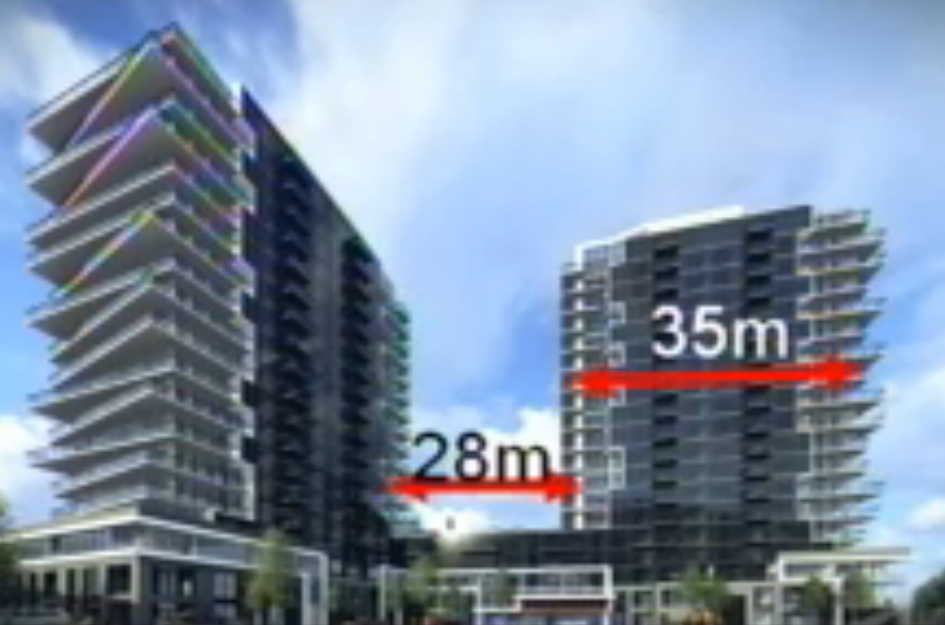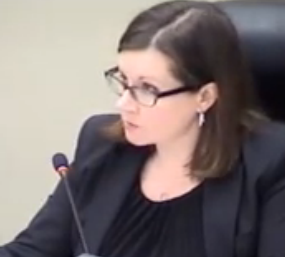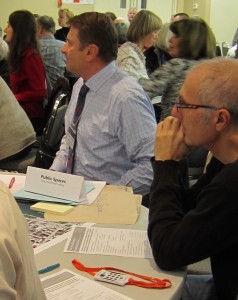 By Pepper Parr
By Pepper Parr
January 7th, 2017
BURLINGTON, ON
Burlington has always choked when it comes to matters that go to the Ontario Municipal Board.
And yet when the Nelson Quarry took the application for an extension of the quarry on Mt Nemo PERL (Protecting Escarpment Rural Land) fought that battle and managed to win.

It took $2 million out of the legal department’s budget to pay for the year long tribunal that decided the Jefferson Salamander was important and that an expansion of the existing quarry should not be permitted. It was rural Burlington residents who were the force behind that battle – they opposed an expansion – shown as the lower part outlined.
The cost to the city was $2.1 million.
Is Burlington’s problem with the way the planners make decisions and write their reports? Or is the problem with the legal department who don’t effectively read the lay of the land?
Whichever, and it might be something altogether different, there is a problem.
 The city now faces a local developer, the ADI development Group, on two development proposals – the Nautique that they want to build at the intersection of Martha and Lakeshore Road and the two 19 storey apartment buildings with a collection of townhouse they want to build at the edge of the Alton Community just south of the 407 at Appleby Line.
The city now faces a local developer, the ADI development Group, on two development proposals – the Nautique that they want to build at the intersection of Martha and Lakeshore Road and the two 19 storey apartment buildings with a collection of townhouse they want to build at the edge of the Alton Community just south of the 407 at Appleby Line.
There is an interesting emergence of events that is worth watching.
The Burlington Planners recommended approving the Alton development after a lot of negotiating and the involvement of a deelopment designer in the process. Anne McIlroy’s group has done some solid work for Burlington in the past, quite why she didn’t say this is the wrong place for this project is difficult to understand. One gets the sense that the planners and the design consultant went into the review exercise committed to make it work – when the community was adamant that is just didn’t work.

Two towers 19 storeys high – in a community made of up two storey homes – being proposed in the name of intensification. Residents didn’t buy it and convinced council to reject a staff recommendation.
The Planning department, after considerable negotiation with the developer recommended that city council approve the requested changes to the Official plan and changes to the zoning that had applied to the property.
The result would be a property that was zoned for a possible ten storey height being increased to 19 storeys – and there would be two of them.

Tammy , planner leading the xxx
The community was incensed.
City council did, in their wisdom, vote against the staff recommendation.
Before the ink was dry on the city council decision the Adi Development Group had an application in to the OMB asking for a ruling – they were cheeky enough to ask for an expedited ruling.
When they took their Nautique project to the OMB they argued that the city had not made a decision on the development application within the required 180 days. When that application did get in front of the OMB, Adi, the developer asked for a delay while the city considered what to do with the abutting piece of property Adi had bought which made it a considerably different application.
Adi then asked for a mediation by the OMB. Are you getting the picture?
With this going on in Burlington, the province is doing a review of the way the Ontario Municipal Board operates. Burlington along with many municipalities that want to see some reform made in what the OMB can and cannot do.
The province is holding a consultation on Ontario Municipal Board Reform that has five key themes.
• Theme 1: OMB’s jurisdiction and powers
• Theme 2: Citizen participation and local perspective
• Theme 3: Clear and predictable decision making
• Theme 4: Modern procedures and faster decisions
• Theme 5: Alternative dispute resolution and fewer hearings
The review process details and background can be found here: at:
The Regional government wrote a Joint submission on behalf of City of Burlington, Town of Oakville, Halton Hills, Milton, Conservation Halton, Grand River Conservation Authority, and Credit Valley Conservation that identified three key recommendations, as outlined below:
1. Scoping appeals
Amend the Planning Act to restrict the scope of matters that can be appealed to the Ontario Municipal Board (e.g. municipally-initiated comprehensive and area wide official plan amendments)
Amend the Planning Act and OMB procedures to effectively scope matters under dispute to restrict appeals that are broad and without basis (e.g. require appeal letters to provide a sound planning rationale for the appeal and include specific policy wording and mapping for those changes being requested).
Restrict appeals (especially third party appeals) that implement municipal comprehensive reviews establishing urban structure.
2. Mediation
Amend the Planning Act and OMB procedures to utilize Alternative Dispute Resolution (ADR) as a ‘first’ solution to resolve land use disputes rather than OMB hearings.
Service delivery of mediation – improving timelines to expedite resolutions.
Apply a merit based approach to appeals.
3. De Novo Hearings
As a decision making authority, the OMB currently has the ability to hear land use planning matters “de novo” (i.e. from the beginning) even though the matter was previously considered by a municipal council.
Amend the Planning Act to limit the opportunities for de novo hearings at the OMB and give validity to Council’s decisions on land use matters.
The Halton staff report contained a detailed response to the OMB Review Public Consultation. That document was approved November 9, 2016 and is commonly referred to as the “Halton Joint Submission” signed by Region of Halton, City of Burlington, Town of Oakville, Halton Hills, Milton, Conservation Halton, Grand River Conservation Authority, and Credit Valley Conservation.
Burlington added comment of their own to the Halton joint submission in which they said:
City staff concur with the recommendations of Halton report LPS118-16. Staff have also identified the following additional items for the Province’s consideration:
1. The current time frame before an official plan or rezoning amendment can be appealed to the OMB based on “Non-Decision” is inadequate; extension of the time frame should be extended to 12 months for OPAs and 9 months for rezonings.
Currently, an applicant can appeal a development application to the OMB if Council has not made a decision within 180 days of an Official Plan amendment application or 120 days of a Zoning By-law amendment application being deemed complete.
This was the justification the Adi Development Group used when they appealed to the OMB on the Nautique development at Martha and Lakeshore.
While it is acknowledged that Bill 73 has provided the option of extending the timeline by 90 days for OPA’s, the City remains of the position that this is not an adequate extension.
Burlington is a municipality that is accommodating the majority of its growth within the built-up area of the city. The applications being received within intensification areas are increasingly complex, requiring significant public and stakeholder engagement, as well as supporting technical studies. The current 180 day and 120 day time periods are inadequate for processing development applications in this context.
Further, the current time frames do not consider the realities of internal report review processes or Committee/Council meeting cycles typical in municipal government.
To place a report on an agenda for Committee/Council consideration typically means that the report is complete up to 1.5-2 months previous to that date. This shortens the period of “Non-Decision” even further to a 4-5 month processing window, placing the municipality in an even more unrealistic position for processing complex applications.
The existing 180-day and 120-day time frames have a number of impacts:
• It puts more applications before the OMB, when the ultimate goal should be to keep applications within the local decision making authority where best efforts are being made to resolve issues outside of the OMB system.
• It penalizes a municipality for striving to conduct a meaningful public consultation process.
• It penalizes a municipality for striving to ensure that quality technical submissions are received to appropriately assess an application.
• It places the municipality in the position of recommending a refusal to Council, taking an adversarial position with the applicant, when in fact, there could still be the opportunity and interest in working through the issues with the applicant, stakeholders and community.
• It places the municipality in a position of risk and uncertainty for making best effort to continue work through issues beyond the 180-days/120 days with increased risk of appeal for every day that passes.
• It does not recognize that it might be advantageous for some applicants to only fulfill the requirements for a complete application, with the intention of triggering an appeal so that a decision would be made through an OMB hearing rather than by a local Council.
• It places a municipality in an unrealistic position for processing a complex development application as it does not consider the time it takes to: resolve issues with the application; fill information gaps in technical studies; consult with the public; and consult with stakeholders and agencies some of which have their own challenges in resourcing application review and preparation of comments.
2. Alternative dispute resolution should be supported by additional provincial funding, and not downloaded to municipalities.
The City is supportive of avenues that reduce the need for an OMB hearing and that places more decision making authority within the local context, and is therefore supportive of the alternative dispute resolution process. However, the dispute resolution process also requires resourcing which should be supported by the Province and not downloaded to municipalities.
3. The period in which to conduct an interim-control study should be an automatic 2-year period, rather than a 1-year period and subject to renewal.
A municipality typically only invokes an interim-control by-law planning tool when a significant matter arises. A significant matter, is often a complex matter, requiring time to conduct a study.
Components of a study process include: issue identification and project scoping; potentially outsourced procurement for technical assistance; public and stakeholder consultation; research and analysis; policy analysis; formulation of recommendations; and, preparation of a staff recommendation report to Council. A one year-time frame can be aggressive, particularly if outsourced consulting support is required as part of the study due to timelines and requirements of the procurement process. The study period should be revised to an automatic 2- year period, rather than a 1-year period, subject to renewal.
4. The scoping of matters that can be subject to OMB appeal should be further expanded and clarified.
To avoid the necessity of re-hearing of local Official Plan matters which have already been resolved by the Province or the Board at the Senior Plan level, the Province should specify that the following matters are not eligible for appeal:
• Regional official plan conformity through local official plan amendments;
• Any local official plan or amendment which is designed as a conformity exercise to an approved provincial plan (except for those provisions of the local plan that may be more restrictive than the senior-level plan).
5. Further clarity should be provided on the Province’s proposal to restrict appeals of planning applications for development that supports provincially funded transit infrastructure such as subways and bus stations.
Staff support, in principle, the restriction of appeals for applications that support transit infrastructure; however, staff question how such appeal restrictions would be implemented. There are many aspects of local official plans, such as the City of Burlington’s current Official Plan, which support transit infrastructure, and many of these aspects will be continued in expanded in future planning, such as the new impending Official Plan and the Mobility Hub Area-Specific Planning which is currently underway. Staff question how to feasibility separate out those aspects of a Plan which are transit-related, and therefore not subject to appeal, from other overlapping aspects of a Plan which are designed to achieve other objectives, and which would be subject to appeal.
6. The Province’s proposal to require land use decisions to reflect current Provincial policy is strongly supported.
Since 2007, the Planning Act has required that land use decisions on applications made after that time must reflect provincial policies in place when the decision is made, not when the application is made. The Province is proposing to extend this change by requiring that all planning decisions, including those for applications made prior to 2007, be based on planning documents in effect at the time of the decision.
Staff strongly support this Provincial proposal. At the present time, there are some dormant pre-2007 applications in the City that were originally submitted in anticipation of new future planning policies coming into force. These applications were essentially submitted as “placeholders” in order to ensure that the previous planning regime would continue to apply, and these applications could be re-activated at any time. Some of these applications are incomplete and do not reflect current planning policies and practices. This proposed Provincial change would ensure that decisions on these applications, if and when they are re-activated, would be able to reflect the current policies.
There will be changes made to the way the OMB works in the future but it is going to take some time for the process to actually see a change.
Will any of this impact the two matters that has the city and the Adi Development group battling it out before the OMB. Hard to tell.
There is one small tidbit of information that makes this really interesting. The Ontario Municipal Board is part of the Environment and Land Tribunals Ontario which is now led by Bruce Krushelnicki who was at one time the planner for Burlington.

Bruce Krushelnicki – former Burlington Director of Planning is now the Chair of the Environment and Land Tribunals Ontario that oversees the work done by the Ontario Municipal Board.
The city wasn’t happy with the way Bruce Krushelnicki was doing the job and after ten years with Burlington he moved on.
He now chairs the Environment and Land Tribunals Ontario (ELTO) which oversees what gets done by the Assessment Review Board, the Board of Negotiation, the Conservation Review Board, the Environmental Review Tribunal, and the Ontario Municipal Board.
Burlington lost a fine planner but that is proving to be the province’s gain.
Krushelnicki wrote the textbook on OMB procedures. He will direct the process that reforms the OMB – it will just take some time – but it will get done – properly.



















